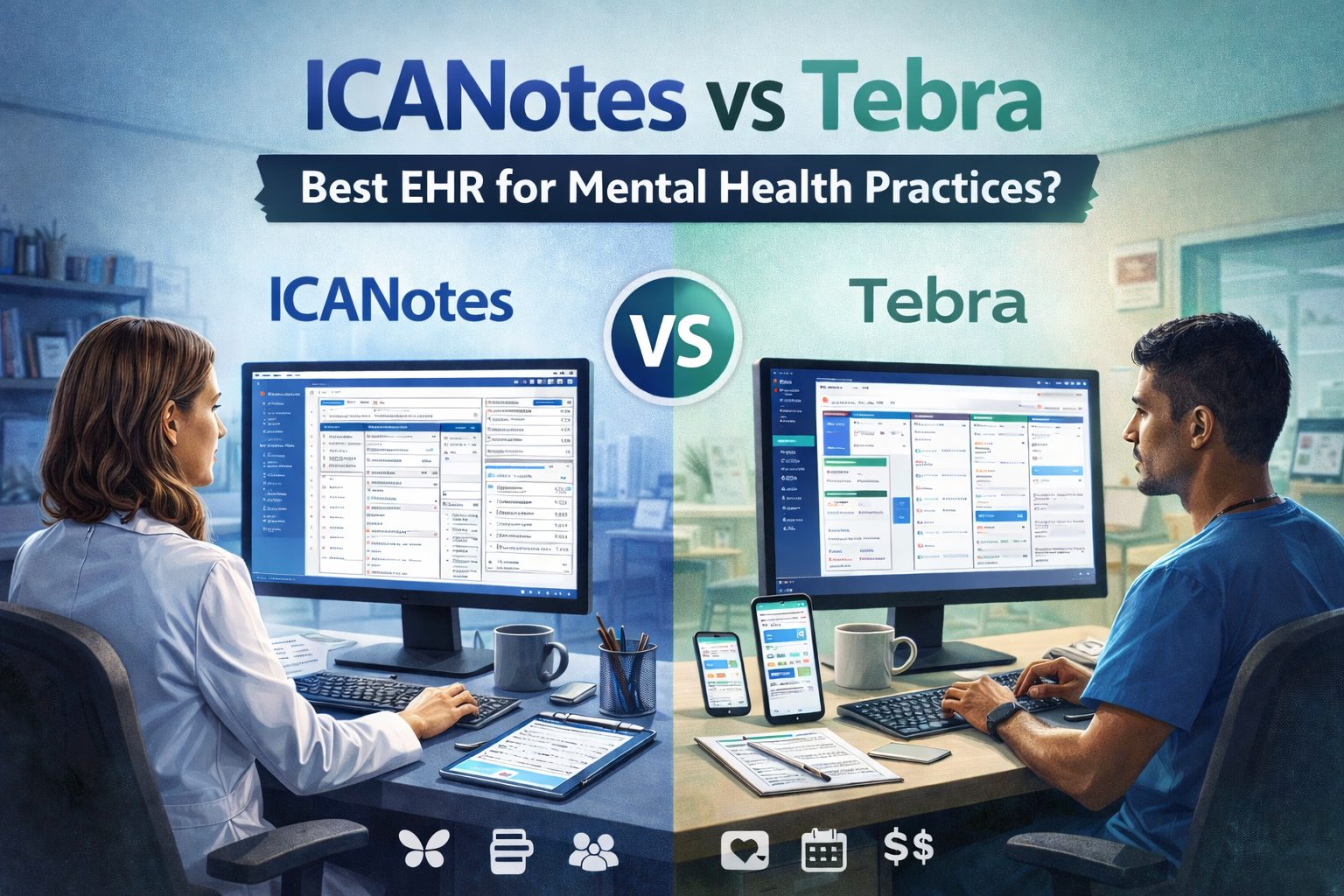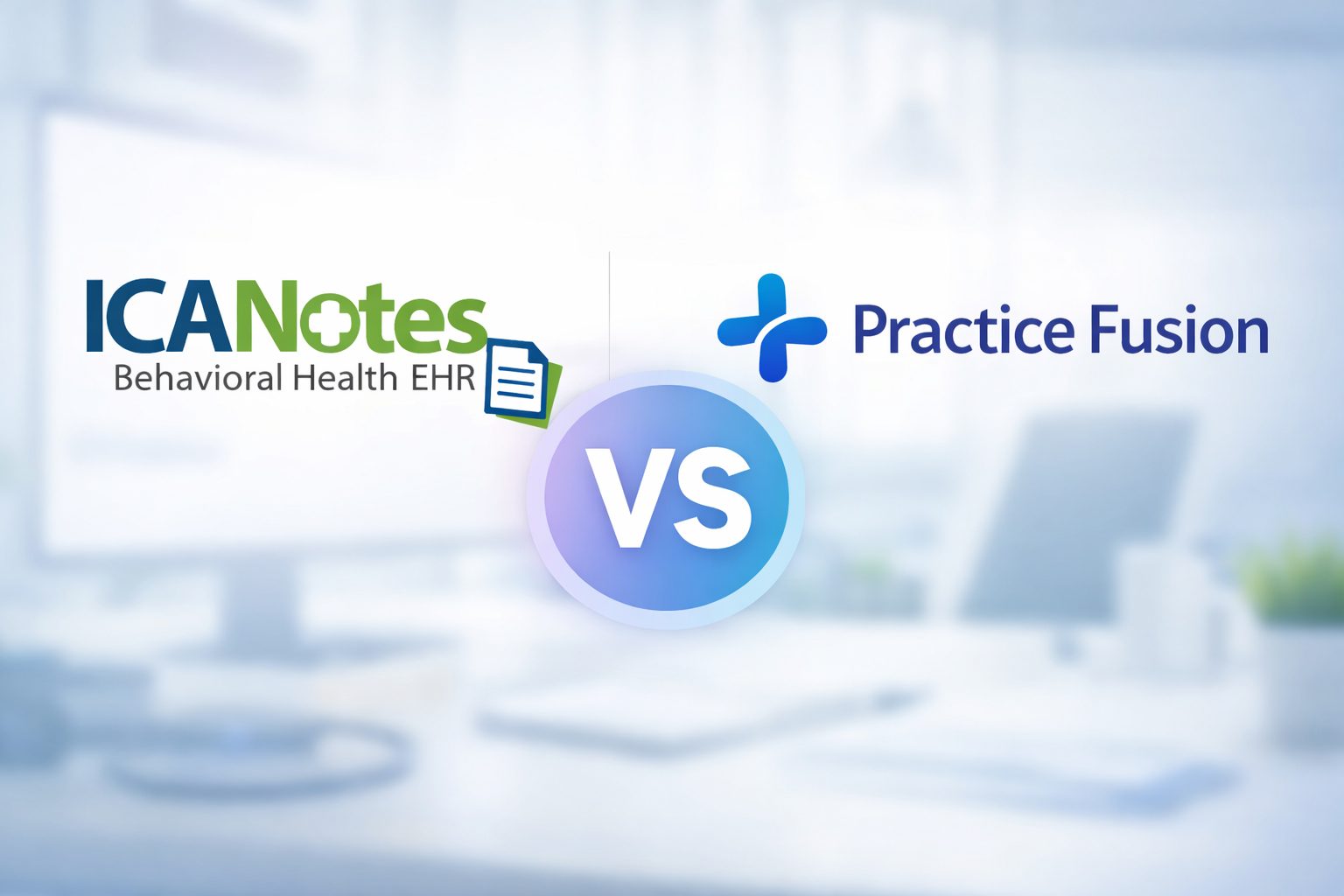Blog > Practice Management > Mental Health Intake Forms: What You Need and Why They Matter
Mental Health Intake Forms: What You Need and Why They Matter
Whether you're opening a new behavioral health practice or are well-established in the field, it can be overwhelming to keep track of all the forms you need to run your practice. The more you know about the behavioral health intake process, the more you can streamline the onboarding process for your clients. In this guide, we'll discuss how to create an efficient intake process, how to build a mental health intake form, and how to keep client forms secure.

Last Updated: August 1, 2025


What You'll Learn
- How to create an efficient intake process for new mental health clients
- What essential forms clients need to complete before starting therapy sessions
- Steps to secure client information and protect sensitive mental health data
- Ways to streamline intake management using electronic forms and software solutions
Mental Health Intake Process for Counseling
What is the intake process in counseling? Many times, a therapist speaks with their client through email or over the phone before their initial session. Through this discussion with the client, you probably have an idea of the symptoms that this client is experiencing. Often, they'll inform you about the specific reason or reasons they're looking for help.
During the first session with a client, you have the opportunity to learn more about their emotional distress and struggles with their mental health. Here are some topics you may want to ask about and address during the first session with a client:
- The client's treatment history
- The client's history with therapy
- The client's goals for therapy
- The client's personal relationships
- Payment
- Ethical concerns
- The therapeutic relationship
Additionally, you may explain the informed consent paperwork to them and allow them to fill out mental health intake forms if they haven't already done so. If your client has already completed these forms, you may want to go over the information they provided.
A lot happens in an initial intake session, which means these sessions tend to run longer than standard sessions. As such, you may want to block off more time for these sessions than you would for other therapy sessions.
The first therapy session tends to make both the client and therapist a bit nervous. A client-therapist relationship can be a delicate one, and as a therapist, you're doing important work — feeling nervous is reasonable. That's why establishing a successful counseling intake process is so helpful.
Streamline your Intakes with this powerful form!
Download our Fillable Biopsychosocial Intake Form
Whether you're onboarding new clients or updating charts, this form helps you gather everything you need in one place.
Before the Mental Health Intake Session
Here are some steps you might need to take before the intake session:
- Prepare the paperwork: Have the necessary paperwork ready for your client to fill out and sign, such as informed consent, a release of information or a social media policy. Determine whether you want potential clients to complete mental health intake forms before or after their first appointment.
- Note important questions for the client: Some clients aren't sure how to begin talking about themselves or their situation in a therapy session and may need some prompting with questions. Jot down questions beforehand that can guide the session as needed.
- Familiarize yourself with the client's background: Review the information that has been provided to you about the client, either from the client themselves or from another therapist or doctor, so you have a better idea of what to expect and can ask relevant questions.
During the Intake Session
When the patient arrives for their initial session, there are some steps you need to take as well, such as:
- Greet them warmly: You want to show empathy and compassion for your client early on, and this begins with a warm greeting.
- Review mental health intake forms and policies: When your client arrives, you'll want to review the forms and procedures and explain to them why these are essential steps in the process before therapy can begin. Ask if they need clarification on any forms or if they need further information.
- Review payment policy: Review your payment policy with your client, so they know whether payment is made at the beginning or end of the session.
- Inform the client about your process: Approaches to therapy can vary from therapist to therapist, so you should provide your client with a brief overview of your process.
- Listen actively and ask questions: Turn toward the client to show you're engaged with them to let them know they have your full attention.
- Ask about their therapy goals: What is this client's end goal for therapy? What do they want to get out of it? Establishing goals reassures the client that you'll be with them on their journey to positive change.
After the Intake Session
After the intake session, you'll want to consider whether you can work with this client and if you wish to give them homework. If you've given the client a diagnosis, you may also want to suggest outside reading material, so they can better understand their condition.
Key Mental Health Intake Forms for Counseling
There are several mental health intake forms that clients need to fill out, including:
- Mental Health Intake form: On an intake form, a client should provide their full name, gender, date of birth, address, contact information, and information about their insurance company. You may also want to include spaces for current medications, personal and family mental health history, reasons for seeking therapy and goals for counseling.
- Informed Consent form: This form protects the patient and establishes they have the right to ask questions and receive information about their care and treatment. This form requires their name, date of birth, signature and date.
- Records Release Authorization form: By signing this form, the patient gives their provider permission to release or receive mental information about them from a second party — this is a voluntarily signed form that they can revoke.
Before you work with a potential client, they should be given these private practice mental health intake forms to protect both you and the client.
Building a Mental Health Intake Form
Should a behavioral health professional develop their own client intake form? Or is a template more useful?
While you may want to create a mental health intake form from scratch, you may be better off using a template or service that provides the form to you. This way, you'll ensure you haven't forgotten to include any relevant information, and you'll save yourself some time. You can always tweak a template to your specific practice needs later.
If you want to eliminate the need for paper, you can use a convenient patient portal through ICANotes that allows your patients to fill out forms online — this makes the process simple and more convenient for both you and the client.
Making Your Mental Health Intake Form Secure
When a patient fills out an intake form, they provide a significant amount of personal information that needs to be protected. To ensure your patient's privacy, you'll need to take certain measures to secure their data — to do this, you can:
- Make forms electronic: Since paper forms take longer to fill out, they can be left on a desk or left in unsecured paper folders. As such, paper forms are more vulnerable to security risks. Using electronic forms means the form is less likely to be susceptible to unauthorized individuals.
- Enable electronic signatures: Electronic signatures eliminate the need for forms to be printed, faxed, or scanned, thus making intake forms less vulnerable to security risks.
- Establish a password policy: Once you have electronic forms, you'll need to protect them with passwords. A password policy needs to be clearly defined and enforced.
- Promptly update software: Updating software when prompted is critical to ensure information stays secure.
Frequently Asked Questions
How ICANotes Streamlines Mental Health Intake Forms
Using ICANotes can significantly improve the efficiency and thoroughness of your intake process. Our software includes a comprehensive, mobile-friendly electronic intake form that covers all the critical components of a behavioral health evaluation. Clients can conveniently complete detailed sections including past psychiatric history, medical history, social and developmental history, and family history—all before their first session.
Once submitted, this intake information is automatically pre-populated into the clinician’s initial assessment document. This not only saves valuable time during data entry but also reduces the likelihood of documentation errors and ensures consistency across client records.
ICANotes also includes preconfigured electronic forms for informed consent, HIPAA privacy notices, and records release, making it easy to meet compliance requirements right from the start. Therapists can further customize the intake experience by configuring additional policy or consent forms for client review and electronic signature. All data is securely stored and fully HIPAA-compliant, giving both providers and clients peace of mind.
By streamlining data collection and documentation, ICANotes enables clinicians to spend less time on administrative tasks and more time delivering quality care.
Schedule a live demo with a product expert or start a free trial today.
Start Your 30-Day Free Trial
Experience the most intuitive, clinically robust EHR designed for behavioral health professionals, built to streamline documentation, improve compliance, and enhance patient care.
- Complete Notes in Minutes - Purpose-built for behavioral health charting
- Always Audit-Ready – Structured documentation that meets payer requirements
- Keep Your Schedule Full – Automated reminders reduce costly no-shows
- Engage Clients Seamlessly – Secure portal for forms, messages, and payments
- HIPAA-Compliant Telehealth built into your workflow
Complete Notes in Minutes – Purpose-built for behavioral health charting
Always Audit-Ready – Structured documentation that meets payer requirements
Keep Your Schedule Full – Automated reminders reduce costly no-shows
Engage Clients Seamlessly – Secure portal for forms, messages, and payments
HIPAA-Compliant Telehealth built into your workflow
Dr. October Boyles is a behavioral health expert and clinical leader with extensive expertise in nursing, compliance, and healthcare operations. With a Doctor of Nursing Practice (DNP) from Aspen University and advanced degrees in nursing, she specializes in evidence-based practices, EHR optimization, and improving outcomes in behavioral health settings. Dr. Boyles is passionate about empowering clinicians with the tools and strategies needed to deliver high-quality, patient-centered care.











